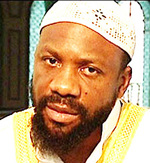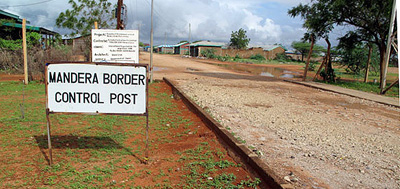One of Kenya’s prominent newspapers said today that Muslim suicide bombers could be a positive force in Africa.
I’ve printed much of the Daily Nation’s article below. It’s important for westerners who perceive themselves the targets if not actual victims of suicide bombing to learn of these contra opinions. The Nation is one of Kenya’s most conservative newspapers.
A little background is required.
A huge controversy has developed in Kenya over the jailed Muslim cleric, Sheikh Abdullah al-Faisal. See my blog of January 9.
No airline will board Faisal. Kenya can’t afford to charter him back to Jamaica. Surrounding countries, including Tanzania whence he came overland about a month ago, refuse to allow him entry. For the time being, Kenya is stuck with him.
He’s been held without charges either in the airport or in a nearby prison. Muslim groups have become more active in the last few days, assembling a team of lawyers that have begun filing motions in the incredibly convoluted Kenyan court system to try to get him released.
The author of the article below, Charles Onyango-Obbo, is a salaried employee of the newspaper. He is not considered a radical.
There is much in the article with which I agree, but ultimately Onyango’s reasoning must confront a serious moral impediment that means justify the ends, the means in this case being wanton murder, and with that I can’t agree. Nor can I agree with the impoverished morality that suicide carries any sort of virtue whatever, except possibly for the individual who kills himself.
Onyango did not use any of the common arguments often purported in the Muslim world to justify Al-Qaeda type movements and terrorism in particular. He did not, for example, try to justify terror as a way of getting the west to leave the Middle East or other areas where radical Muslims believe they have a more intrinsic right to power.
The reason I find this article so fascinating is that it argues that there is value to terror, even if there is no enemy to practice it on, no oppressor. Onyango states that suicide bombers, for example, create positive dialogue and promote local peace among disparate groups. This is an argument as convoluted as the Kenyan court system.
Perhaps, the newspaper agreed to publish this article, because somehow it thought it would dampen the growing tension in Kenya between Muslim groups lobbying for Faisal’s release and those who fear him.
The motive would be good, but the effect is not. Bad arguments don’t bring peace.
Below are excerpts from Charles Onyango-Obbo’s article in the January 14, 2010, issue of Nairobi’s Daily Nation. Click here for the full article.
[Sheikh Abdullah al-]Faisal’s problems…stem from the suspicion that he might be a religious extremist.
That, in turn, seemed to have been fuelled (sic) by the Christmas incident in which the young Nigerian, Umar Farouk Abdulmutallab, an alleged Al Qaeda operative, botched an attempt to destroy a plane carrying 290 people flying from Amsterdam to Detroit.
… It would seem, after that, suspicion heightened over every radical Islamic preacher.
The acts of people like Abdulmutallab often tar many innocent Muslims, and in some parts of the world, especially the West, Muslim has become synonymous with terrorist. Every other day, you read of stories of areas where Christians are protesting because a Muslim has moved into the neighbourhood.
But looking at suicide bombers acting in the name of radical religion from Africa, one sees more interesting things. It is heartening, in a strange way, to see an African willing to kill others for something other than his tribe, political affiliation, or personal profit.
Abdulmutallab’s action should resonate in Kenya, where following the disputed December 2007 elections, thousands of people were slaughtered and displaced because of their ethnic origin or the political party they supported. Or, better still, Rwanda where in 1994, nearly one million were killed mostly because they were Tutsi…
… Abdulmutallab was … willing to die … by being a suicide bomber. This idea of a most extreme personal sacrifice is not new in Africa, but it is not common either. …It is rare to see people in most African countries going to this extent. Apart from soldiers … we don’t usually put our necks on the line for our countries.
All this is good, for several reasons. First, religion is actually a big idea. If more of us begin to kill only for big ideas, and not small ones like tribe and who you voted for at elections, we shall see a sharp decline in violence in Africa… From Abdulmutallab’s act of terrorism might grow the first true seeds of modern patriotism in Africa.
Finally, before the Jihadists came along, there wasn’t much of a dialogue between Christians and Muslims in Africa, in part because in the countries where Muslims are a minority, they had endured a history of discrimination…
Following the September 11, 2001 terrorist attack on the World Trade Centre in New York … Islam made its biggest effort to explain that terrorism was not in the Qur’an. It found fearful Christians, eager for reassurance, were much more willing to listen than they had been in the past.
… Muslims were energised to defend the honour of their religion against attempts to besmirch all of them… One result in countries like Uganda and Kenya is that they used it to elect more Muslims to Parliament.
Many governments in Christian-dominated countries also sought to do something they had not been serious about — Muslim representation in public life. Muslims moderates, particularly, have flourished…
Entirely by accident, radical Islam-inspired terrorism might turn out to be the best thing to happen to both Islam and the politics of many countries in Africa: It has improved inter-faith dialogue, reduced marginalisation (sic) of Muslims, given them a little more voice, and by forcing countries to rally around something other than their tribes, could do African nationalism endless good.

